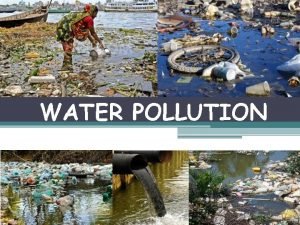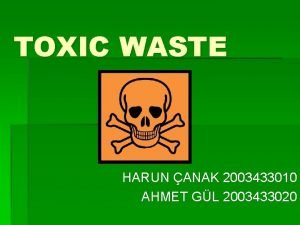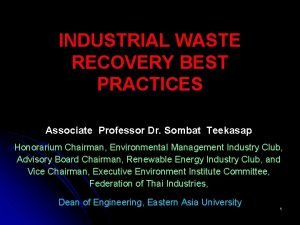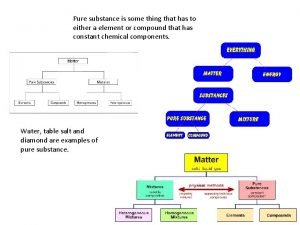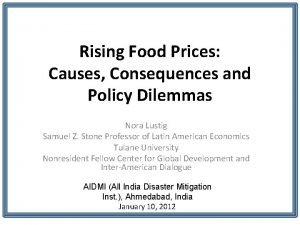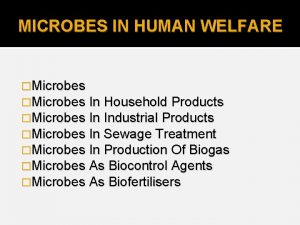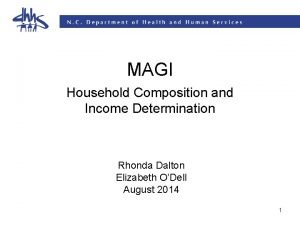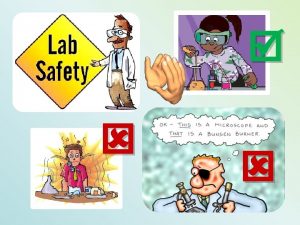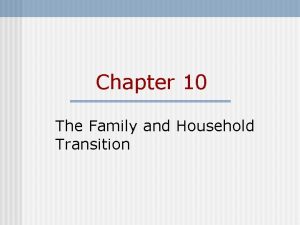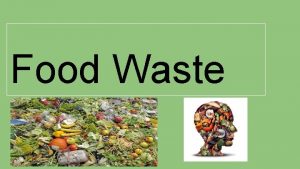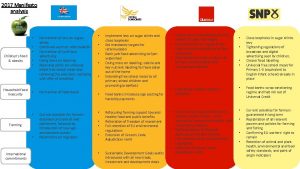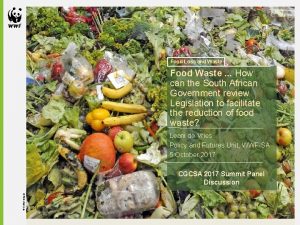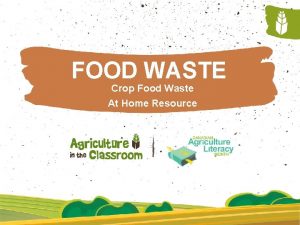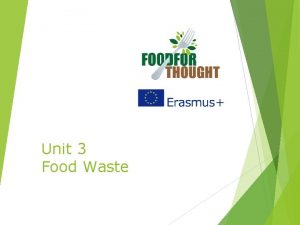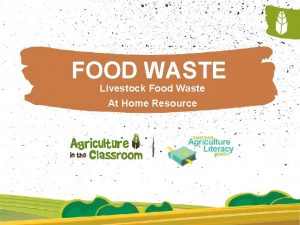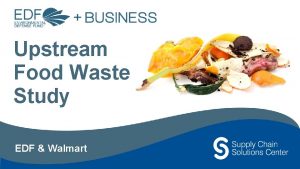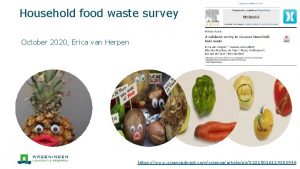Waste Causes Household waste Industrial waste Food waste





















- Slides: 21

Waste

Causes • Household waste • Industrial waste • Food waste

Household waste • Household waste is post-consumer waste which includes consumer products, home care products, personal care products, automotive care products, household chemicals and more. • With the expansion of the world population, the amount of household waste increases dramatically. • Moreover, consumer behavior changed over time which resulted in even more waste production. • Examples for that are the increasing number of online purchases. Items purchased online need more wrapping as if bought in a normal store. • Additionally, people return their products quite frequently which causes even more garbage since in many cases, not only the wrapping has to be renewed, even the product itself will be disposed due to economical or regulatory reasons.

Industrial waste • Industrial waste can be defined as the waste caused by industrial activities including which is rendered useless during manufacturing. • This includes masonry and concrete, dirt and gravel, scrap metals, oil, chemicals, solvents, scrap lumber and more produced by factories, mills and industries. • It may appear in liquid, gaseous or solid form. • Industrial waste can be radioactive, toxic, corrosive, ignitable or reactive. • It can lead to the pollution of soil, air and water.

Food waste • Large amounts of food are produced every day. • However, a big fraction of this food is disposed even before it reaches our grocery stores. • This may be due to minor issues. • For example, if a cucumber has too much curvature, it is regarded as not suitable for our grocery stores and therefore is treated as garbage. • This is not only true for cucumbers but also for many other food items. • This behavior leads to a huge waste of resources since the food would be suitable for consumption. • It is just thrown away because of its unaesthetic physical appearance. • Moreover, even if the food reaches our grocery stores and people buy it, a significant fraction of our food ends up in the garbage since we do not consume it. • In addition, many people are afraid to consume food if the best before date is reached even if the food still is in good shape and not dangerous to human health.

Effects • Environmental impact • Economic impact • Burning of fossil fuels • Mismanagement of waste • Gases from industrial processes • Global warming • Nuclear accidents

Environmental impact • If waste is not disposed appropriately, it can attract insects and rodents, which in turn can harbor parasites, worms, yellow fever, the plague and other serious conditions for humans. • Also, there is a big risk for cancer if humans are exposed to hazardous waste which is burned without sufficient protection. • Toxic waste can pollute groundwater, soil, surface water and air which can cause many problems for human as well as for environmental health. • Moreover, gases like CO 2 and methane, which are a by-product in many production processes, have an adverse impact on our environment since theses gases increase the speed of global warming.

Economic impact • There are large economic costs related to the managing and appropriate disposal of waste. • The long-term consequences may even be more dramatic than short term issues. • For example, the inappropriate disposal of nuclear waste may cause huge environmental problems in the future since the short term solutions for this issue do not take into account the long term consequences appropriately.

Burning of fossil fuels • In order to be able to get rid of the huge amounts of waste which is produced every day, significant amounts of fossil fuels have to be burned in this process. • The use of fossil fuels will in turn lead to air pollution and will also increase the speed of global warming since many harmful greenhouse gases will be produced in the combustion processes.

Mismanagement of waste • In order to get rid of waste in a proper way, there have to be effective waste disposal processes in place. • If there is a lack of proper processes, mismanagement of waste may be the result. • This could mean that waste is not disposed in landfills or burned but rather it is just disposed illegally in forests or lakes. • This mismanagement can lead to serious pollution of the environment and therefore can adversely affect many animals and plants.

Gases from industrial processes • There are several harmful gases which are released in the burning process related to waste disposal. • These gases may lead to acid rain. • Moreover, they may also contribute to the global warming issue. • Especially gases like CO 2 and Methane are known to be quite harmful greenhouse gases.

Global warming • Through our consumption behavior and the resulting great amounts of waste, the global warming process is enhanced in a dramatic way. • On the one hand, the production of goods leads to the emission of greenhouse gases. • On the other hand, also the disposal of waste leads to the emission of greenhouse gases through combustion processes. • Thus, through our excessive consumption levels, we indirectly contribute to an increased speed of global warming and its resulting consequences.

Nuclear accidents • Nuclear energy is one of the biggest source for energy production in our nowadays technological society. • In order to get rid of the nuclear waste, extreme safety measures have to be taken. • Accidents with nuclear waste could contaminate large areas of land. • Moreover, the incorrect disposal of nuclear waste could also harm many animals, plants and even humans. • Making things worse, nuclear waste usually takes quite a long time to lose its harmful compounds. • Thus, if nuclear waste is not disposed properly, the contaminated areas will be useless to humanity for a quite long period of time.

Solutions • Education and raising awareness • Regulations and negative externalities • Effective waste management systems • Re-use and recycling of materials • Convince others

Education and raising awareness • In order to solve the issue of waste, we have to educate people on how their daily life habits adversely affect the environment. • This has to start early in school as part of the obligatory subjects like math or geography. • People have to get aware what they are doing, what consequences their action have for other people and the environment and how to improve their behavior. • For example, coffee to go is so popular in our society now. • Yet, the number of cups thrown away after just one usage is dramatic. • Paying attention to this small detail and stop using disposable cups would reduce the waste problem quite a bit. • There are several more things to do in our daily lifes in order to reduce garbage which are not hard at all. People are just convenient and do not care about it. • We have to raise awareness to this issue in order to reduce the amount of waste.

Regulations and negative externalities • If people are too convenient or not willing to reduce their garbage, there should be interventions by government or local communities. • This could be a scheme in which sustainable behavior is acknowledged and harmful behavior is punished. • This could be in the form of financial upside through the form of reduced taxes for good environmental behavior and increased taxes for harmful economic behavior. • This system should also be valid for industries. If an industry imposes negative externalities on the environment, this should result in a financial compensation for the community. • With this approach, firms would have a big incentive to develop economical-friendly systems and to reduce their adverse impact.

Effective waste management systems • An effective waste management system is crucial for sustainable economic and ecological development. • However, the waste management system should be used in conjunction with a profound resource management plan. • An RMP (resource management plan) is part of an integrated material management plan, in which a municipality makes deliberate decisions about how materials should flow. • An RMP includes specific tactics how to deal with certain materials after these materials had been consumed. • This includes the prevention, generation, reuse, recovery, collection, transfer, recycle and disposal tactics.

Re-use and recycling of materials • Many waste products from industries could be reused in other industries, yet it may be too costly at this point in time and not economically worth it. • Thus, private companies are rather throwing away their by-products than to sell them to other companies who could reuse them. • The government or municipals should support research in order to find more effective solutions for the reuse of waste products so that our natural resources can be used in the most efficient manner and garbage will be reduced.

Convince others • As we have seen, our actions matter! • However, in order to be able to make an even more significant impact to mitigate the waste problem, we also should convince our family and friends to change their waste production behavior. • We can do this on a daily basis. • For example, if you go shopping, you can convince your friends to use reusable bags instead of plastic bags. • If you cook together, you can convince your family or friends that waste separation is crucial in order to reduce the adverse impact of waste on our environment. • Through all these little but quite effective measures, you can have a much bigger impact than if you just apply these measures but never talk about them.

Conclusion • Their are many problems related to the management of waste in our world today. • Households and industries produce don’t care enough yet to reduce this problem. • This issue has a dramatic impact on the ecological system. Inefficient or flawed waste management systems can lead to the spread of diseases. • Moreover, burning waste leads to an emission of greenhouse gases which contributes to global warming. In order to mitigate this problem, waste management must be developed further to a place where almost every material can be recycled. • Moreover, we have to raise the awareness of people to change their behavior in daily life. • People should be convinced to use things longer than they do in current times. • People replace things that are actually working through things that are more trendy. We have to get to a place where reusing stuff is the most trendy thing on earth and buying new stuff is dodgy in order to solve the waste problem.

Sources • https: //en. wikipedia. org/wiki/Waste • https: //wwf. panda. org/knowledge_hub/teacher_resources/webfieldtrips/waste_dis posal/ • https: //www. sciencedirect. com/topics/earth-and-planetary-sciences/waste-disposal
 Water pollution introduction
Water pollution introduction Proximate cause and ultimate cause
Proximate cause and ultimate cause Proximate causes vs ultimate causes
Proximate causes vs ultimate causes Unit 2 food food food
Unit 2 food food food Sequence of food chain
Sequence of food chain Toxic waste causes
Toxic waste causes Industrial waste recovery
Industrial waste recovery Forms of sound energy
Forms of sound energy 3 causes of food spoilage
3 causes of food spoilage Rising food prices causes and consequences
Rising food prices causes and consequences Institutional catering examples
Institutional catering examples Useful and harmful
Useful and harmful Microbes in household products
Microbes in household products Magi household
Magi household Metric to household conversion
Metric to household conversion What's household composition
What's household composition Household product symbols
Household product symbols Household and firm
Household and firm How do series and parallel circuits differ
How do series and parallel circuits differ Naverageat
Naverageat Compare
Compare Common household chores method of heat transfer
Common household chores method of heat transfer
